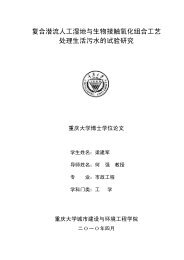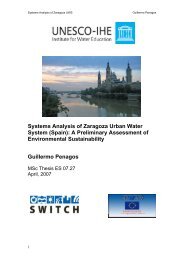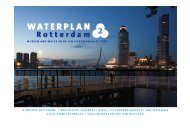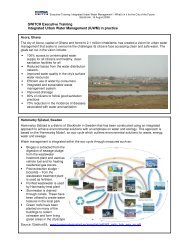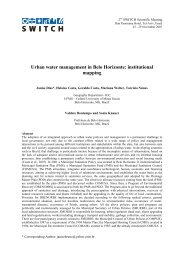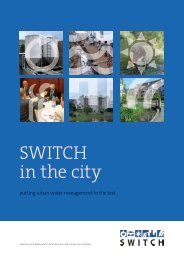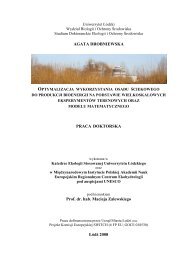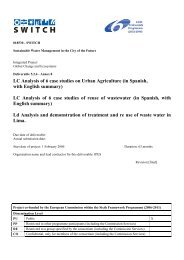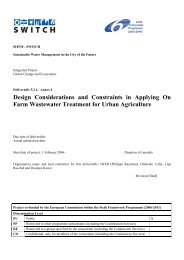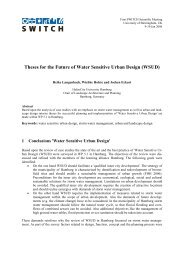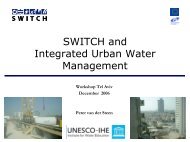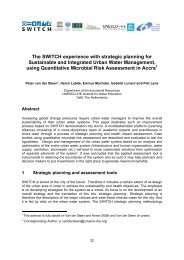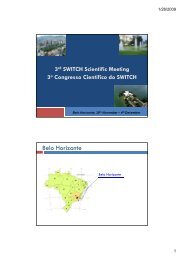Good practices for Social inclusion - Case studies and summary
Good practices for Social inclusion - Case studies and summary
Good practices for Social inclusion - Case studies and summary
You also want an ePaper? Increase the reach of your titles
YUMPU automatically turns print PDFs into web optimized ePapers that Google loves.
Increased efficiency of public spending: Budget participants scrutinize data, <strong>and</strong> the<br />
explanations <strong>and</strong> decisions made by authorities. Reduces corruption <strong>and</strong> clientelism<br />
(funds can more easily be traced, there are few overpriced contracts, more promises are<br />
kept <strong>and</strong> fewer unnecessary investments are made). Sewer line construction rapidly<br />
increased following the introduction of PB - 1989 to 1996, the portion of the population<br />
with access to sewer lines rose from 46% to 95%. The pace <strong>and</strong> quality of road paving<br />
leapt – from 4 km per year prior to the PT administration to 20 km per year after 1990.<br />
Extended favelas became accessible to buses, rubbish trucks, ambulances <strong>and</strong> police cars<br />
as a result. Following initial resistance from construction companies <strong>and</strong> a boycott, such<br />
companies found benefits from the new regime of fewer bribes needed, more contracts<br />
<strong>and</strong> more punctual payment of bills.<br />
Higher participation by poorer people: Areas in the poorest category represented only 12% of<br />
the city's inhabitants, they accounted <strong>for</strong> almost a third of the 1995 assembly participants.<br />
Evidence of improved tax payment: evasion drops when local residents feel they have greater<br />
say over expenditures, <strong>and</strong> see better use <strong>and</strong> management of finances.<br />
Source: Rebecca Abers, 1996 <strong>and</strong> 1997, as reported in<br />
http://www.chs.ubc.ca/participatory/docs/op.pdf 54<br />
Box 4 : Benefits from participatory budgeting in Porto Alegre<br />
Despite the rapid spread of PB in Brazil, success is not a given. Concerns are beginning to be<br />
raised regarding PB effectiveness <strong>and</strong> its future in Porto Alegre. Following a change in the<br />
municipal government in 2004, one observer has seen a lessening of political commitment 55 .<br />
Comparative analysis of eight PB initiatives in Brazil has also found varying outcomes 56 <strong>and</strong><br />
this study identifies critical success factors as the ‗incentives <strong>for</strong> mayoral administrations to<br />
delegate authority, the way civil society organizations <strong>and</strong> citizens respond to the new<br />
institutions, <strong>and</strong> the particular rule structure that is used to delegate authority to citizens‘ A<br />
comparison with other countries in Latin America, (Brazil, Bolivia, Guatemala, Nicaragua<br />
<strong>and</strong> Peru) 57 found that results are partially shaped by the intentions of those designing the<br />
process <strong>and</strong> the pre-existing conditions in each particular place. ‗National legal m<strong>and</strong>ates <strong>for</strong><br />
PB have not created widespread local success in encouraging citizen participation, fiscal<br />
transparency, <strong>and</strong> effective municipal government. This is partially because designers of<br />
national laws had other goals in mind (possibly in addition to these goals) <strong>and</strong> partially<br />
because of local obstacles, including reluctant mayors or opposition parties, weak fiscal <strong>and</strong><br />
administrative capacity of municipal governments, <strong>and</strong> fragmented, conflict-ridden civic<br />
associations‘ 58 .<br />
54 Rebecca Abers (1996) "From ideas to practice: the Partido dos Trabalhadores <strong>and</strong> participatory governance in Brazil"<br />
Latin American Perspectives 91(23), 35-53. And Rebecca Abers (1997) "Learning democratic practice: distributing<br />
government resources through popular participation in Porto Alegre, Brazil" p.39-65 in: Michael Douglass & John<br />
Friedmann (eds.) "Cities <strong>for</strong> Citizens: planning <strong>and</strong> the rise of civil society in a global age" Chichester (UK): John Wiley &<br />
Sons. And Abers, R. N. (2000) Inventing local democracy: grassroots politics in Brazil. Boulder: Lynne Rienner Publishers.<br />
55Michael Fox (2008) North American Congress on Latin America. http://nacla.org/node/4566<br />
56 Wampler, (2007) op cit.<br />
57 Benjamin Goldfrank, (2006) ‗Lessons from Latin American Experience in Participatory Budgeting‘, University of New<br />
Mexico, Presented at the Latin American Studies Association Meeting, San Juan, Puerto Rico, March (2006).<br />
http://www.internationalbudget.org/themes/PB/LatinAmerica.pdf<br />
58 Goldfrank, (2006) op cit.<br />
92



